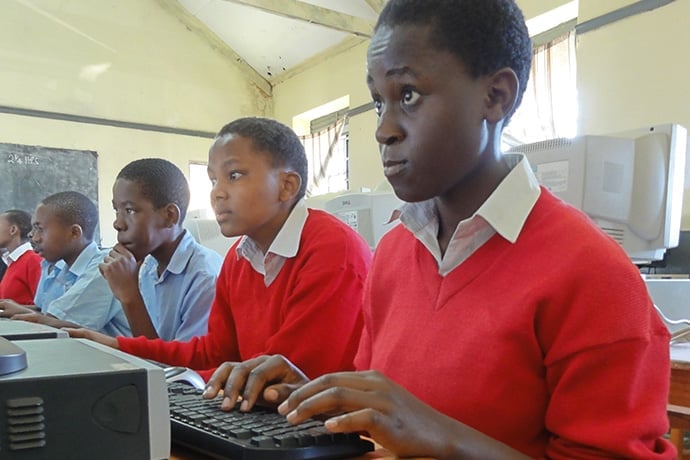Think for a minute about how you and your friends learn computer science. Do you have a family member that teaches you or answers questions? Do you have classes at school? What about after school classes? Are there organizations in the town or city where you live that offer coding classes for kids?
In most cities in the United States computer science is available to kids, at least to those who are able to take an after school class. To make it available for nearly all kids, more school districts have begun to require that it be taught in school, however most still do not. In rural areas and low-income areas, access to computer science for kids is still uncommon.
Do kids in other countries have access to computer science education? Use the map below to help you answer the following questions about computer science for kids around the world.
- Approximately how many countries around the world mandate that all students learn computer science in either primary or secondary school (or in both)?
- In 2021 only one state in the United States required computer science to be a mandatory subject in both primary and secondary school. Which state is this?
- One country in Africa mandates that computer science be taught in both primary and secondary school. Which country is this?
- Name TWO countries that mandate that all students receive computer science education in either primary or secondary school.
- In approximately how many countries is computer science NOT taught in school?

You can check your answers at the bottom of the page. How did you do? Do you find any of the answers particularly surprising?
Answers:
-
-
- All the light and dark blue countries mandate that computer science is taught in primary or secondary school, or both (between 30-40 countries).
- Arkansas is the only state in the US to mandate CS is taught in both primary and secondary schools.
- Ghana is the only country in Africa to mandate CS is taught in both primary and secondary schools.
- Any light or dark blue country.
- All of the uncolored/gray countries, approximately 60-70 countries.
-
In parts of the world, particularly Europe and East Asia, many countries mandate that all students learn the fundamentals of computer science (CS) in either primary or secondary school, or both. This is much different than the United States, where in most of the country some schools offer computer science for kids, but it is not mandatory. As a result, many schools do not. Only about 4% of students in the US actually take a CS class in school before graduating from high school. And perhaps not surprising, but still eye-opening, is that there are significant portions of the world in which computer science is not available at all in public schools or even after school programs.
Africa stands out as one part of the world where computer science education is particularly difficult to come by. The few bright spots include Ghana, Morocco, Nigeria, Tunisia, South Africa, Botswana, and Zimbabwe. Unfortunately, throughout the rest of the continent it appears that there is almost no opportunity to learn computer science, and even the countries in which CS education is available, it is not always easy to find.
However, there is tremendous potential for computer science to grow and thrive in many African countries over the next decade. Many countries in Africa have very young and motivated populations, two traits that are ideal for computer scientists. Approximately 23 African countries have over 40% of their population 14 years old or younger. By comparison, in the United States only about 18% of the population falls into this age category.
Also, many African countries have quickly growing economies. This likely means that their populations are gaining more access to wealth, which can lead to increased access to computers and the internet. Finally, on average African countries are now spending approximately 5% of their GDP (5% of their budget) on education, the second highest rate of spending on education in the world! This indicates that many African governments are trying to improve education for their young populations. Perhaps some of this can go towards computers, internet, and teacher training so that more kids across Africa have the chance to learn how to use and program computers.
Large portions of Africa are still quite underdeveloped compared to other parts of the world, and the infrastructure to support learning computer science takes time to set up. But many indicators show there is incredible potential for growth in the subject across the African continent. Look out for the next issue of Beanz in which we will dive deeper into some of the challenges and successes of expanding computer science education across Africa!
Learn More
Computer Science Education is a Global Challenge
https://noise.getoto.net/2021/10/27/computer-science-education-is-a-global-challenge/
Building Skills for Life
Five destinations to pursue computer science
https://www.avanse.com/blog/top-5-study-abroad-destinations-to-pursue-computer-science
NC State first in Computer Science Education
STEM and Computer Science
https://www.education.pa.gov/Educators/Certification/CertFAQs/Pages/STEMCS.aspx
Why High School Students should learn computer science
https://www.youtube.com/watch?v=t3Y4p-6YWnQ
The Importance of Computer Science for High School Students
https://www.marlborough.org/news/~board/stem/post/computer-science-programs-for-high-school-students
Linking Literacy and Computer Science
https://www.edutopia.org/article/linking-literacy-and-computer-science-elementary-school
Computer Science Standards for Elementary
https://www.kodable.com/learn/betterteaching/
CS can help Africans develop skills for the future
Why is computer science education important?
https://equip.learning.com/computer-science-education-important
Expanding Computer Science Education
https://theconversation.com/want-to-expand-computer-science-education-educate-more-teachers-181697

